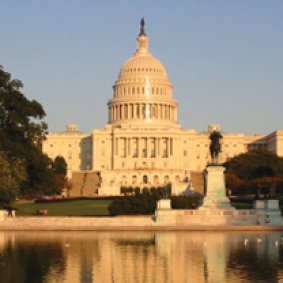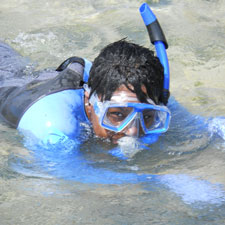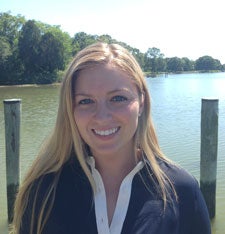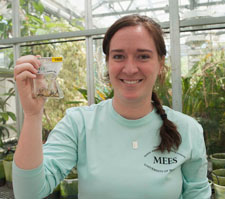Knauss legislative fellowships in Congress help build careers — and they're fun and educational. See our video and fact sheet for details.
Maryland Sponsors 2015 Knauss Fellows

Graduate Students Will Support Federal Programs on Issues Including Climate Change and Sea Turtle Conservation
Three graduate students from Maryland will employ their scientific knowledge to help the federal government develop marine policy in 2015. With support from Maryland Sea Grant, these students began their year-long Knauss Marine Policy Fellowships in February. All three will work for the U.S. National Oceanic and Administration (NOAA) in the Washington, D.C. area.
Jeanette Davis has joined NOAA’s National Marine Fisheries Service. She assists the Office of Science and Technology in its sea turtle conservation efforts, working to develop stock assessments for vulnerable populations.
 |
| Jeanette Davis assists the National Marine Fisheries Service at NOAA. Credit: Jeanette Davis. |
Davis is a doctoral student at the University of Maryland Center for Environmental Science's Institute of Marine and Environmental Technology in Baltimore. She has explored the bacterial communities that are associated with tropical sea slugs that congregate near Hawaii every spring to mate. Some of these microbes may produce compounds that could have uses in human medicine, such as to fend off cancer.
Originally from Wilmington, Delaware, Davis received her bachelor's degree from Hampton University in Virginia. During that time, she lived for a month on a 53-foot sailboat as part of a research internship. She hopes that her Knauss Fellowship will give her a grounding in marine policy and help her to apply her scientific knowledge to developing policies that benefit the natural world.
Jessica Foley is spending her fellowship year in the Office of Oceanic and Atmospheric Research at NOAA. There, she works with members of the administration’s leadership on diverse topics, including the oceans and Great Lakes, climate, and weather.
 |
| Jessica Foley works in the Office of Oceanic and Atmospheric Research at NOAA. Credit: Jessica Foley. |
Foley is a master’s student in the Marine Estuarine Environmental Sciences Program at the University of Maryland. Her research focuses on a mathematical model that addresses the growth of seagrass beds in the Delmarva Peninsula’s coastal lagoons, adjacent to the Atlantic Ocean. Foley’s research will help scientists to track how changes in the future — such as rising temperatures associated with climate change — might affect the health of this important green life.
Foley's introduction to estuarine science came as an undergraduate student at the University of Rhode Island, where she studied mangrove trees growing in Puerto Rico for her senior thesis. She has also founded a student-run collegiate field hockey program, worked at a wastewater treatment facility, and spent many summers knee-deep in wetlands from bogs to salt marshes and mangroves.
Brittany Marsden serves as the inaugural Knauss Fellow in the Formulation and Congressional Analysis Division at NOAA. She helps the administration to develop its research priorities, communicate the significance of NOAA research to Congress, and helps scientists get the funding they need to carry out their work.
 |
| Brittany Marsden is the inaugural Knauss Fellow in the Formulation and Congressional Analysis Division at NOAA. Credit: Daniel Strain |
Marsden is a doctoral student in the Marine Estuarine Environmental Sciences Program at the University of Maryland. Her research addresses the genetic diversity and growth patterns of submersed aquatic vegetation (SAV) growing in the Chesapeake Bay watershed.
Marsden, who received her undergraduate degree from the University of Richmond, previously worked as an environmental educator, first with the Chesapeake Bay Foundation and later at the Patuxent Research Refuge in Maryland. Among other activities, Marsden organized and led educational experiences for young students, helping high schoolers, for instance, to search for arrowheads and other historic artifacts on eroding Bay islands. Those experiences sparked her desire to pursue an interdisciplinary career in marine conservation.
The Knauss Fellowship, begun in 1979, is designed to let outstanding graduate students spend a year working on science policy in Washington, D.C. The program, coordinated by the National Sea Grant Office, places fellows in legislative or executive branch offices in the federal government that work on ocean, coastal, and Great Lakes policy issues. Fellowships run from February 1 to January 31 and pay a yearly stipend plus an allowance for health insurance, moving, and travel. Applicants must apply through the Sea Grant program in their state.
For more information on the program, see Maryland Sea Grant's resource page here. You can also visit NOAA's Knauss Fellowships page.



